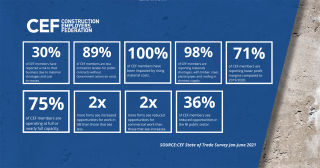The Construction Employers Federation of Northern Ireland warns that its members are reeling from cost increases and, without intervention, may stop bidding for public sector work altogether.
Latest state of trade survey by the Construction Employers Federation (CEF) found that 30% considered themselves at risk of folding in the face of materials shortages and unsustainable cost increases.
The survey was conducted in late June and contained the responses of 80 Northern Ireland-headquartered construction firms with a combined turnover of £1.5bn a year.
All respondents said that they had been impacted by rising material costs – 78% seriously impacted and 38% critical.
Without government action on costs, 89% said that they were less inclined to bid for public contracts – 48% are significantly less inclined and three firms have already pulled out of public sector work.
Earlier this week the Construction Leadership Council (CLC), a UK group based in London, said that the way to address the current market volatility was to adopt seldom used but readily available standard clauses in construction contracts
"Most forms of construction contract have standard provisions for managing volatility, without the need to make contract amendments,” said CLC co-chair Andy Mitchell in an open letter to the industry. “These provisions, such as fluctuations provisions in JCT and NEC 4 Secondary XI, provide a means of collaboratively sharing the risks associated with this volatility... They are ideally suited to providing a means for managing the volatile period we are now entering and therefore CLC strongly urge those responsible for developing, agreeing and managing contracts, existing and new, to consider adopting these provisions in their contracts."
However, local government clients in Northern Irelands are deleting these standard clauses, the CEF says, so the protection recommended by the CLC is not available.

Mark Spence, managing director of the Construction Employers Federation said: “The results of our latest state of trade survey paint in very stark terms how the period since Christmas has seen a significant downturn in business sentiment among our members.
“While the immediate impact of the onset of the pandemic in March 2020 was tough, it is the challenges on materials supply and cost increases in the last number of months which are bringing to the fore much more fundamental questions about business survival.
“This is exacerbated by the even more worrying trend that there does not, at this stage, appear to be a forecast of costs falling back to any sort of ‘norm’. This is a vital concern for future pipelines of public sector work as all budgets previously agreed will no longer give cover to the procuring authority to commit public funds.
“In our urgent discussions with government, we have requested that they speedily consider these matters to allow pragmatic decision making and prevent a seizure in our local pipeline of public contracts. We have also urged the inclusion of inflationary mechanisms in all new contracts to provide cover for such situations now and in the future.
“This is because the procurement model upon which we have relied upon has been shown to no longer be fit for purpose – contractors in GB have contractual remedies in their contracts which Northern Ireland procuring bodies have seen fit to delete or chose not to include. CEF has demanded their reinstatement and a more robust contractual model to take us forward, future-proofed for any future ‘unforeseen’ series of circumstances. We are working together to manage a scale and range of risks that only 18 months ago would have seemed fanciful and unnecessarily dramatic.
“While we await outcomes on this, for those engaged in commercial work the issues are equally threatening and much more dependent on individual relationships with clients and strength of contractual terms. For contractors carrying out home improvements or facilities management, or those in the supply chain of larger contractors, the issue is how to deliver on prices given in good faith and having to rely upon working in partnership and under sub-contracts to ensure viability of the work being undertaken.
“This is a moment of immense challenge that we can already see far eclipses the one-off price increases after the 2016 Referendum and the immediate impact of the onset of the pandemic combined. While the reasons for it are many and varied, the on-the-ground reality is of a sector that urgently needs supported in order to remain sustainable.”
Got a story? Email news@theconstructionindex.co.uk



